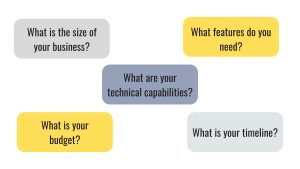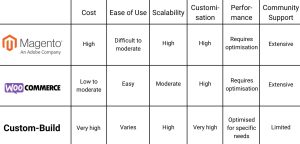Choosing the Right eCommerce Platform
Introduction In the ever-evolving world of eCommerce, choosing the right platform for your business is a critical decision that can significantly impact your success. The righ...

Introduction
In the ever-evolving world of eCommerce, choosing the right platform for your business is a critical decision that can significantly impact your success. The right platform will support your growth, provide the tools you need to manage your online store, and provide a seamless customer experience. Among the many options available, Magento, WooCommerce, and custom solutions stand out. This guide will walk you through the process of choosing the best eCommerce platform for you by comparing these three popular options.
Understanding Your Business Needs
Before diving into the specifics of each platform, it’s important to assess your business requirements. Consider the following questions.

- What is the size of your business? Are you a small startup, a growing mid-sized business, or a large enterprise?
- What is your budget? How much are you willing to invest initially and for ongoing maintenance?
- What are your technical capabilities? Do you have an in-house tech team or will you need external support?
- What features do you need? Consider essential features like product management, payment gateways, shipping options, and scalability.
- What is your timeline? How quickly do you need to launch your eCommerce store?
By answering these questions, you’ll have a clearer picture of your needs and be able to better assess which platform is best for you.
Magento
Magento, an Adobe company, is a robust e-commerce platform designed for businesses of all sizes, especially those with large product catalogues and high transaction volumes. It offers two main editions: Magento Open Source (formerly Community Edition) and Magento Commerce (formerly Enterprise Edition).
Pros
Scalability: Magento is highly scalable and can handle high volumes of products and transactions, making it ideal for growing businesses.
Customisation: It offers extensive customisation options, allowing you to tailor the platform to your specific needs. With access to the source code, developers can create unique features.
Feature-rich: Magento comes with a variety of built-in features, including advanced SEO tools, marketing capabilities, and customer segmentation.
Community Support: The Magento community is large and active, providing a wealth of resources, extensions, and support.
Cons
Complexity: Magento can be difficult to set up and manage, requiring a steep learning curve and technical expertise.
Cost: While Magento Open Source is free, Magento Commerce has a significant price tag. Additionally, hosting, development, and maintenance costs can add up.
Performance: Without proper optimization, Magento can be resource-intensive, which can lead to poor performance.
Best suited for
Magento is best suited for medium to large businesses with a substantial budget and access to technical expertise. It is ideal for companies with complex requirements and high transaction volumes.
WooCommerce
WooCommerce is an open-source eCommerce plugin for WordPress, making it a popular choice for small and medium-sized businesses. It offers a user-friendly interface and seamless integration with WordPress.
Pros
Ease of use: WooCommerce is relatively easy to set up and manage, especially for those familiar with WordPress.
Cost-effective: The plugin itself is free, and many themes and extensions are available at a price. This makes it a cost-effective solution for small businesses.
Flexibility: WooCommerce is highly flexible and customisable, with an extensive library of themes and plugins to extend functionality.
SEO-friendly: WooCommerce, built on top of WordPress, inherits its SEO capabilities, making it easy to optimise your store for search engines.
Cons
Scalability: While WooCommerce can handle a reasonable amount of traffic and products, it can struggle with very large stores without significant optimisation.
Security: As an open-source platform, WooCommerce requires careful security measures to protect your store from vulnerabilities.
Performance: Like Magento, WooCommerce can suffer from performance issues if not optimised properly, especially in shared hosting environments.
Best for
WooCommerce is a great choice for small to medium businesses looking for an affordable, easy-to-use solution. It’s ideal for those already using WordPress or those with a limited budget and average technical skills.
Custom Solutions
Custom eCommerce solutions are designed from the ground up to fit your business needs. This approach provides unmatched flexibility and control, but it comes with its own set of challenges.
Pros
Full Customisation: With a custom solution, you have complete control over every aspect of your store, ensuring that it meets your exact specifications.
Unique Functionality: Custom solutions can include unique features and integrations that are not available on standard platforms.
Scalability: Custom solutions designed specifically for your business can scale as your business grows.
Performance Optimisation: Custom platforms can be optimised for performance, ensuring fast load times and a smooth user experience.
Cons
Cost: Developing a custom solution is often expensive, requiring a significant initial investment and ongoing maintenance costs.
Time-consuming: The process of developing a custom solution can be lengthy, which can delay your launch.
Developer-dependent: You will be dependent on your development team for updates, maintenance, and troubleshooting.
Best for
Custom solutions are best suited for larger businesses with unique requirements and a significant budget. They are ideal for companies that want full control over their eCommerce platform and are willing to invest in a custom solution.
Comparing eCommerce Platforms

Cost
Magento: High (especially for Magento Commerce)
WooCommerce: Low to moderate (depending on plugins and hosting)
Custom-Built: Very high
Ease of Use
Magento: Difficult to moderate (requires technical expertise)
WooCommerce: Easy (especially for WordPress users)
Custom-Built: Varies (depends on the complexity of the solution)
Scalability
Magento: High
WooCommerce: Moderate
Custom-Built: High (tailored to your needs)
Customisation
Magento: High
WooCommerce: High
Custom-Built: Very high
Performance
Magento: Requires optimisation
WooCommerce: Requires optimisation
Custom-Built: Optimised for specific needs
Community Support
Magento: Extensive
WooCommerce: Extensive
Custom-Built: Limited (depends on the development team)
Making a Decision
When choosing the right eCommerce platform for your business, it’s important to weigh the pros and cons of each option based on your specific needs and resources. Here’s a quick summary to help you decide:
- Choose Magento if you’re a medium to large business with complex requirements, a significant budget, and access to technical expertise.
- Choose WooCommerce if you’re a small to medium business looking for an affordable, easy-to-use solution, and already use or are comfortable with WordPress.
- Choose a custom solution if you’re a large enterprise with unique requirements, a significant budget, and a need for complete control over your platform.
By carefully assessing your business needs and understanding the strengths and weaknesses of each platform, you’ll be able to make an informed decision that will set your eCommerce store up for success.